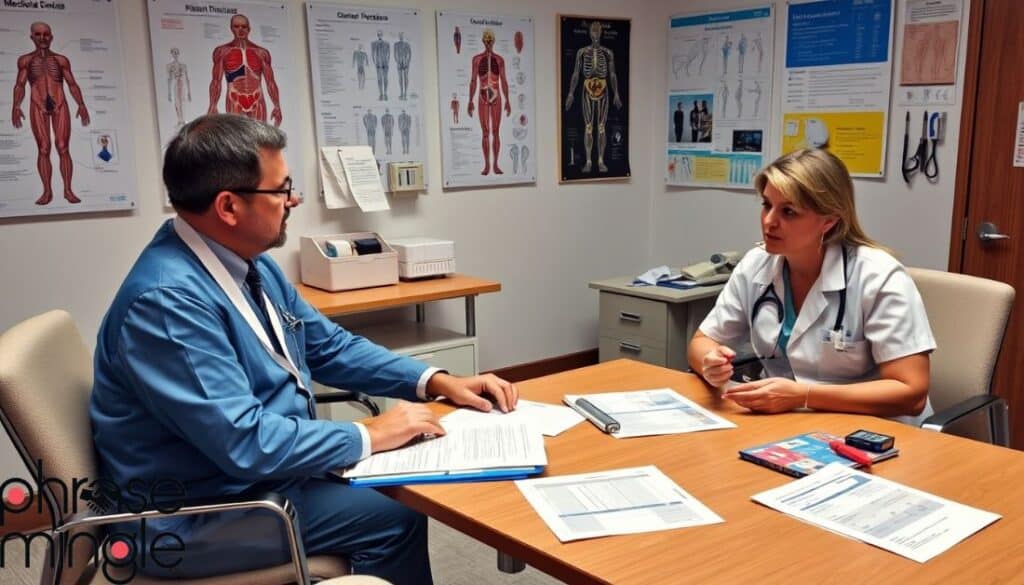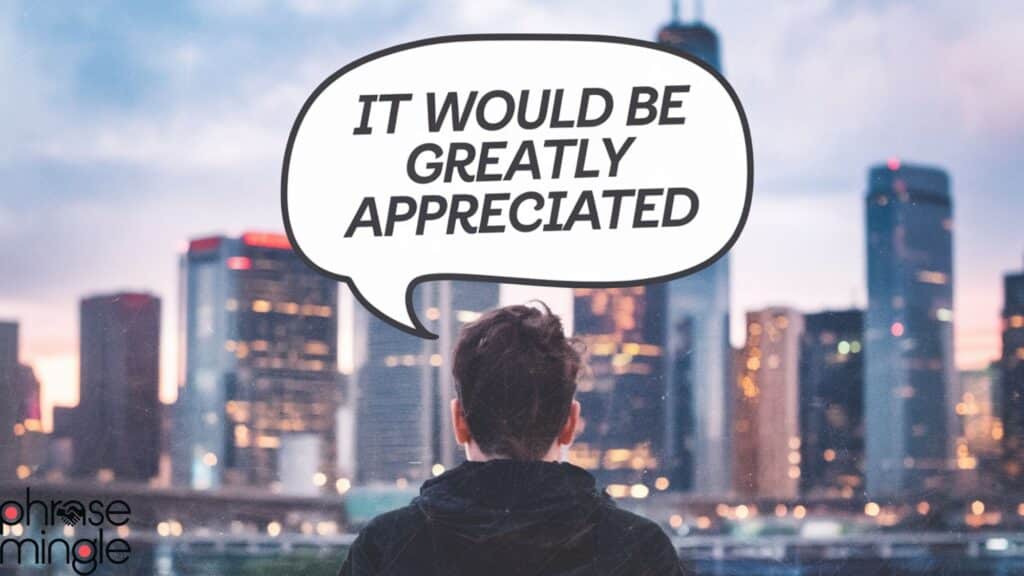In today’s fast-paced professional world, knowing how to express “It would be greatly appreciated” elegantly can make all the difference. Whether you’re drafting an important email or making a crucial request, the way you phrase your gratitude matters.
Let’s dive into fresh, impactful alternatives to the common phrase “it would be greatly appreciated” and explore when to use each one.
Casual Yet Professional Options
Everyday Office Communication

1.“You’d be a lifesaver!”
Perfect for: Urgent but informal requests to colleagues you know well
Example: “If you could review this report by EOD, you’d be a lifesaver!”
2. “That would make my day”
Best used: When someone’s help would genuinely turn things around
Example: “If you could cover my shift tomorrow, that would make my day.”
3. “I’d owe you one”
Implies: A reciprocal relationship where favors are exchanged
Example: “I’d owe you one if you could proofread this proposal.”
Client-Friendly Alternatives
When communicating with clients, you need options that show both respect and warmth:
| Phrase | When to Use | Example |
|---|---|---|
| “Your input would be invaluable” | High-stakes decisions | “Your input on the campaign strategy would be invaluable.” |
| “We’d love your take on this” | Collaborative projects | “We’d love your take on this design concept.” |
| “Your expertise would really shine here” | Specialized tasks | “Your expertise in data analysis would really shine here.” |

Formal Business Expressions
High-Stakes Situations
4. “We would be most grateful for your consideration
Formality Level: Very High
Best for: Board meetings, investor communications
Example: “We would be most grateful for your consideration of our proposal.”
5. “Your support would be instrumental”
Emphasizes: The critical nature of their help
Use when: Their involvement could make or break a project
Example: “Your support in securing this client would be instrumental.”
Executive-Level Communication

When addressing high-level executives, consider these options for saying “it would be greatly appreciated”
6. “Your endorsement would carry significant weight”
Acknowledges their influence and authority
Example: “Your endorsement of this initiative would carry significant weight with the board.”
7. “We would be honored by your contribution”
Shows deep respect while making a request
Example: “We would be honored by your contribution to our advisory panel.”
Time-Sensitive Requests

Urgent but Polite Options
Deadline-Driven Alternatives
When timing is crucial, try these expressions:
8. “We’d be grateful for your expedited review”
Professional and urgent
Example: “We’d be grateful for your expedited review of the contract.”
9. “Your quick input would be a game-changer”
Emphasizes impact
Example: “Your quick input on the market analysis would be a game-changer.”
Industry-Specific Variations
Tech Sector
In the tech world, appreciation often revolves around specific skills:
10. “Your code review would be clutch”
Casual yet professional
Example: “Your code review before the push would be clutch.”
11. “We’d value your debugging expertise”
Acknowledges specialized skills
Example: “We’d value your debugging expertise on this tricky issue.”
Creative Fields
Creative industries often use more expressive language:
12. “Your artistic input would elevate this project”
Perfect for: Design collaborations
Example: “Your artistic input would elevate this branding project.”
13. “Your creative touch would take this to the next level”
Use when: Seeking innovative solutions
Example: “Your creative touch would take this campaign to the next level.”
Cultural Considerations
American Business Culture
14. Direct appreciation: “
This would really help us out” Straightforward and friendly
Example: “Getting your feedback by Friday would really help us out.”
15. Value-focused: “Your contribution would add significant value”
Emphasizes impact
Example: “Your contribution to the strategy would add significant value.”
Modern Professional Phrases
Tech-Inspired Options
In today’s digital workplace, some contemporary phrases have gained traction:
16.“Your input would level up our project”
Perfect for: Startup environments
Example: “Your insights on user experience would level up our project significantly.”
17. “We’d be stoked to have your backing”
Best for: Casual, creative environments
Example: “We’d be stoked to have your backing on this new initiative.”
18. “Your expertise would be a game-changer here”
Use when: Highlighting the impact of someone’s specific skills
Example: “Your data analysis expertise would be a game-changer here.”
Industry-Specific Alternatives
For Finance Professionals
19.“Your analytical prowess would add tremendous value”
Context: When requesting financial review or analysis
Example: “Your analytical prowess would add tremendous value to our investment strategy.”
20. “We’d welcome your risk assessment expertise”
Perfect for: Compliance or audit situations
Example: “We’d welcome your risk assessment expertise on this new venture.”
For Healthcare Settings

21. “Your clinical judgment would be instrumental”
Use when: Seeking medical expertise
Example: “Your clinical judgment would be instrumental in developing this treatment protocol.”
22. “Your patient care insights would enhance our approach”
Best for: Healthcare improvement initiatives
Example: “Your patient care insights would enhance our approach to post-operative care.”
Time-Sensitive Yet Graceful
23. “Your swift consideration would be a blessing”
Combines urgency with gratitude
Example: “Your swift consideration of our proposal would be a blessing.”
24. “We’d be thrilled to get your eyes on this ASAP”
More casual, still conveys urgency
Example: “We’d be thrilled to get your eyes on this campaign ASAP.”
Relationship-Building Phrases
For Long-term Partnerships
25. “Your ongoing support continues to be invaluable”
Acknowledges existing relationship
Example: “Your ongoing support of our initiatives continues to be invaluable.”
26. “We’d be honored to have your continued backing”
Shows respect for established connections
Example: “We’d be honored to have your continued backing as we expand into new markets.”
Expert Tips for Implementation
Choosing the Right Phrase
- Relationship level with the recipient
- Industry norms and expectations
- Urgency of the request
- Cultural context of the communication
Common Mistakes to Avoid saying “it would be greatly appreciated”
- Over-formalizing casual relationships
- Using tech-speak in traditional industries
- Neglecting to match the tone to the situation
International Business Etiquette
Different cultures require different approaches:
| Culture | Phrase | When to Use |
|---|---|---|
| British | “We should be most obliged” | Formal business correspondence |
| Japanese-inspired | “Your honorable assistance would be treasured” | High-respect situations |
Psychology Behind Appreciation
The Impact of Genuine Gratitude
Research shows that authentic appreciation:
- Strengthens professional relationships
- Increases likelihood of future collaboration
- Creates a positive work environment
Building Relationships Through Thoughtful Requests
Key elements of effective appreciation:
- Specificity
- Sincerity
- Appropriate formality level
Practical Applications
Email Templates Using Various Phrases
Formal Request
Subject: Request for Project Review
Dear (Name) like Julia
I hope this email finds you well. Your expertise would be invaluable in reviewing our latest project proposal. The team has put together a comprehensive plan, and your insights would significantly enhance our approach.
We would be most grateful if you could provide your feedback by next Friday.
Best regards,
Your Name: like, Jack
Casual Team Request
Hey team,
We could really use your help with brainstorming solutions for the client presentation next week. Your creative input would make a huge difference!
Let me know if you can join us tomorrow at 2 PM. You’d be a lifesaver “it would be greatly appreciated”
Thanks,
Your Name: like, Tony
Conclusion
The art of appreciation lies in choosing the right phrase for the right situation. By varying your language and keeping it authentic, you can make your requests more effective and build stronger professional relationships. Remember:
- Match the formality to the situation
- Be specific about what you’re appreciating
- Keep it genuine and concise
Your mastery of these alternatives to “it would be greatly appreciated” will set you apart in your professional communications. After all, in the words of Maya Angelou, “People will forget what you said, people will forget what you did, but people will never forget how you made them feel.”

Jamze Hope,
I am a writer at Phrase Mingle, where i shares insightful phrase guides to help readers enhance their language skills. With a passion for words and clear communication, Jamze creates engaging content that simplifies complex expressions, making them accessible to all.







